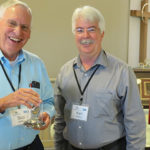WACO—A church that depends upon its pastor for ministry fails both the pastor and the laypeople, ministry strategist Alan Nelson told participants at the Next Big Idea conference at Baylor University.
A litany of woes afflict the local church in America, noted Nelson, former executive editor of Rev magazine and founder of KidLead, a leadership training program for children age 10 to 13. He is author of Me to We, a book on equipping laity for ministry.
On any given weekend, only 20 percent of Americans attend church, and that percentage is expected to be cut in half by 2050, Nelson said. Less than 15 percent of U.S. churches are growing, and less than 1 percent are growing because of evangelism.
“We have no reason to believe these trends will turn around,” he lamented. “We’re seeing a significant macro-exiting of the local church.”
| {youtube}fpY4777V2XI{/youtube}
Alan Nelson founded KidLead, described as America's only leadership development program that specifically targets leaders when they're moldable.
|
On the local level, the pastor, staff and the “faithful few” are overworked, and as outreach is becoming more difficult, spiritual maturity is lacking.
The cause is Pastor-Centric Ministry Syndrome—extreme dependence upon pastors to do the work of the church, Nelson said.
The solution is for pastors to focus on equipping church members to do ministry, he said. To illustrate, he reported that, in healthy churches, 93 percent of members are “mobilized in some form of ministry service,” while the number drops to 11 percent in unhealthy congregations.
“The Bible teaches ministry in context of togetherness,” with pastors and laity serving alongside each other, he said.
Sign up for our weekly edition and get all our headlines in your inbox on Thursdays
Scripture shows Moses, Jesus and the Apostle Paul all trained others to minister and delegated significant responsibility to them, he added.
“Jesus knew that if he got sucked into the minutia of ministry, he could not do God’s will,” he said, pointing to the numerous times Jesus either pulled away, leaving responsibilities to the disciples, or hand-picked Peter, James and John for mentoring.
Unfortunately, the church drifted away from shared ministry to pastor-centered ministry, Nelson said. One reason is economics—churches structure their staff sizes proportionate to their congregational size, so that they can afford to pay ministers to do their ministry for them, he insisted.
Another reason is social and psychological, he added, noting: “Ministry feeds the ego. We (pastors) think, ‘No one can provide the quality of care we do.’ So, we give in to unrealistic expectations and unhealthy co-dependence between pastor and congregation.”
Fortunately, recent church trends have tilted toward equipping laity for ministry, he said. Reasons range from the complexity of ministry; to the strong desire for laypeople to serve others; to the rise of education and information, which empowers laity to take on ministry that earlier generations would not have attempted.
Benefits of the trend include lay “ownership” of the church’s responsibilities, increased use of spiritual gifts, and “the synergistic effect builds unity and momentum, diminishing criticism and consumerism,” he said.
For this to work in a church, not only must the pastor embrace the value of equipping laity, but a “partner” must join with the pastor to advocate the value in the church, he said. A plan for implementing the equipping system can be found at www.churchvolunteercentral.com, he said.














We seek to connect God’s story and God’s people around the world. To learn more about God’s story, click here.
Send comments and feedback to Eric Black, our editor. For comments to be published, please specify “letter to the editor.” Maximum length for publication is 300 words.